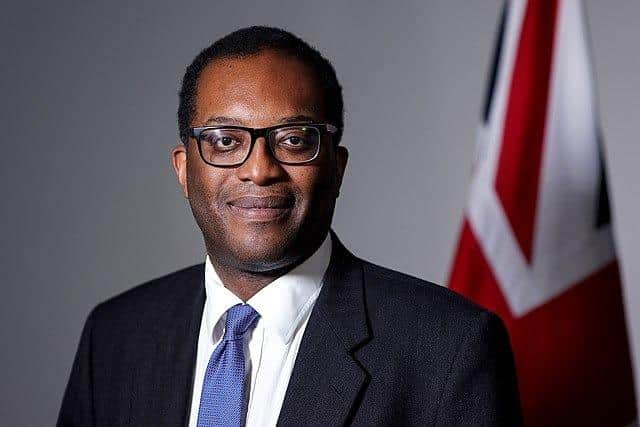Kwarteng was born in the London Borough of Waltham Forest on May 26, 1975, the only child of parents who had emigrated from Ghana as students in the 1960s.
By Emma Ogbuehi (With Agency)
As the economic fortunes of Britain continues to plummet, the Prime Minister Liz Truss, on Friday, fired the Finance Minister Kwasi Kwarteng.
According to an earlier report by the BBC, the Prime Minister was said to be set to relieve the Chancellor of the Exchequer his job, barely one month after he was tipped for the prestigious position.
The British-born Ghanaian Kwarteng was appointed Chancellor of the Exchequer by the then incoming Prime Minister Liz Truss on September 6, 2022.
On September 23, 2022, he announced a set of economic policies named “The Growth Plan 2022” in what the Treasury described as a “fiscal event”; this was dubbed a “mini-budget” by the media.
Reporting on the matter earlier, a British tabloid, The Telegraph tweeted: “The Telegraph now understands that Liz Truss is set to remove Kwasi Kwarteng as Chancellor this afternoon.
“It was thought that the PM’s press conference would be held at 2pm, but the exact timing is now up in the air.”
But shortly thereafter, Kwarteng announced his resignation via Twitter confirming the earlier reports.
READ ALSO: DMO counters Bloomberg, says Nigeria not planning to extend repayment of debts
“It is important now as we move forward to emphasize your government’s commitment to fiscal discipline,” Kwarteng said in the letter addressed to Prime Minister Liz Truss.
“The Medium-Term Fiscal Plan is crucial to this end, and I look forward to supporting you and my successor to achieve that from the backbenchers.”
Meanwhile, there is yet no significant shift in market reaction following the resignation.
Kwarteng was born in the London Borough of Waltham Forest on May 26, 1975, the only child of Alfred K. Kwarteng and Charlotte Boaitey-Kwarteng, who had emigrated from Ghana as students in the 1960s.
His mother is a lawyer and his father an economist in the Commonwealth Secretariat.
After starting school at a state primary school in Waltham Forest, Kwarteng attended Colet Court, an independent preparatory school in London, where he won the Harrow History Prize in 1988.
Then he went to Eton College, where he was a King’s Scholar and was awarded the Newcastle Scholarship prize.
He read at Trinity College, Cambridge, achieving a double first class degree in classics and history in 1993, and twice winning the Browne Medal.
He was a member of the team which won the BBC quiz show University Challenge in 1995. At Cambridge, he was a member of the University Pitt Club, and has since returned to visit.
Kwarteng was a Kennedy Scholar for a year at Harvard University, and then earned a PhD degree in economic history from the University of Cambridge in 2000, with a thesis titled Political thought of the recoinage crisis of 1695–7.
Before becoming a member of parliament, Kwarteng worked as a columnist for The Daily Telegraph and as a financial analyst at JPMorgan Chase as well as at WestLB and the hedge fund Odey Asset Management.
He wrote a book, Ghosts of Empire, about the legacy of the British Empire, published by Bloomsbury in 2011.
He also co-authored Gridlock Nation with Jonathan Dupont in 2011, about the causes of and solutions to traffic congestion in Britain.
Analysts say that Kwarteng’s exit signals how tenuous Liz Truss’ hold on power is, with many predicting a revolt by the Tories and her possible ouster.
Her tax cut policy has backfired with her taking a step back from the policy.







